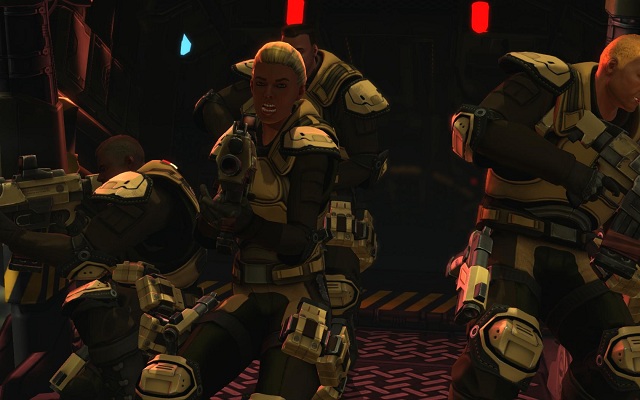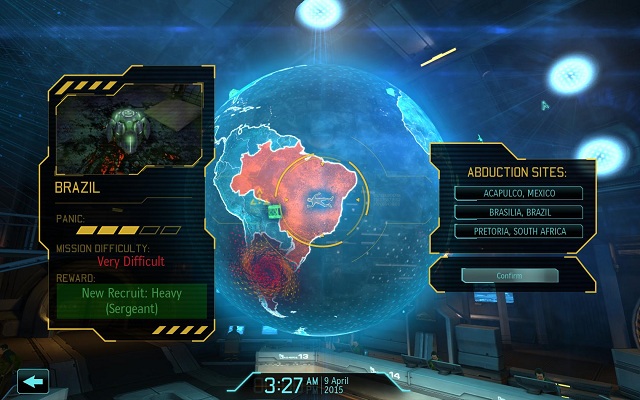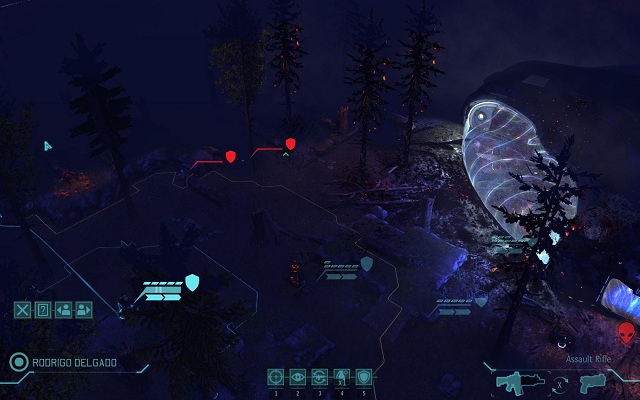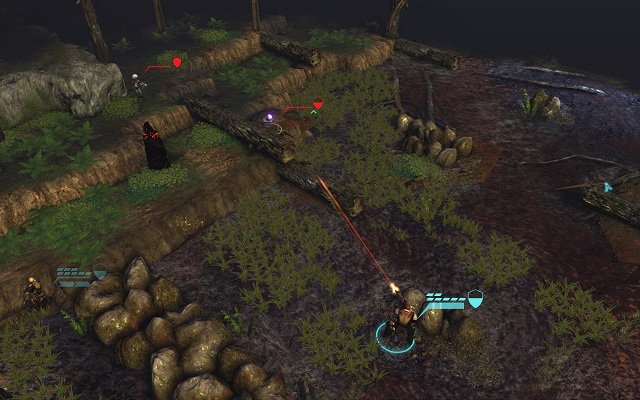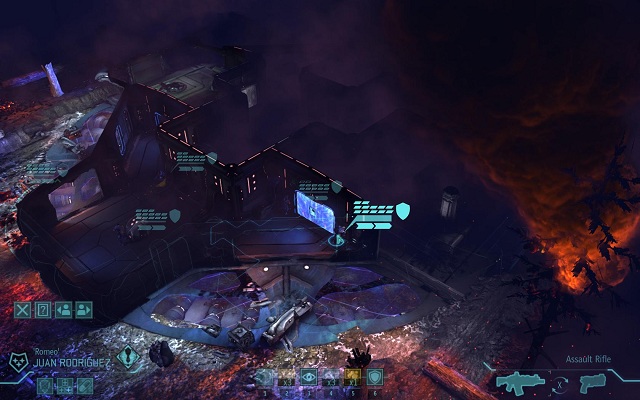I’ll tell you what I know. We set down deep into the Nigerian interior on Council orders to get this thing. As we approached the downed alien craft, our assault team dashed into position using their run-and-gun tactic to double-time it to the UFO and eliminate a couple of little gray men crouching near the exterior walls.
Our support unit dropped smoke to cover our breach of the hull doors while our sniper watched over the entrance and our heavy-weapons expert laid down a suppressing fire just to be sure. The plan seemed fine.
We didn’t even see the strange creatures with surgically implanted jetpacks drop down behind our position and flank us. As they rained death from above onto the whole team, a ball of light raised itself up off the UFO floor and transformed into a bipedal monstrosity, which then turned its attention to the forward units and cut them down.
I’m lucky to be alive. … I had to fall back to the Skyranger and dust off from the crash-site investigation. I only hope this report can assist the next team as I recover in the infirmary. End log.
XCOM: Enemy Unknown, developer Firaxis’ update to the revered turn-based strategy classic X-Com: UFO Defense, is filled with stories like this. Ones that you write yourself as you send squad after squad into battle to hold off a planet-wide extraterrestrial invasion.
Those skirmishes are the heart of the series, so I set out to see what’s new and what’s different from the original. Publisher 2K Games provided me with a preview build of Enemy Unknown, and what follows are three new concepts that I think you’ll love and three old ideas you might miss from UFO Defense.
Mission variety
In a typical X-Com (or XCOM) campaign, you’re going to send dozens of soldiers to their deaths over the course of hundreds of tactical engagements. In other words, you’re going to spend a lot of time on the battlefield. And although UFO Defense features different pretenses for missions (like UFO crash-site investigations, alien base raids, and saving terrorized metropolises around the globe), they all boil down to a simple kill everything objective.
Enemy Unknown smartly adds actual goals for your military excursions. Every once in a while, The Council (nations that form the XCOM organization’s governing body and fund the operation) will pick up the red phone and ask you to send a strike team for a specialized task. That might include disarming a hidden bomb while simultaneously disabling nearby power nodes to buy yourself more time (you only have three turns!) or locating the survivor of an alien abduction and leading her to an extraction point.
These add welcome variety to what might otherwise cause even the most hardened commanders to burn out on the monotony of “kill, kill, kill.”
The two-action system
This change is likely to be contentious among long-time fans, but with it comes a step forward for the series: Enemy Unknown makes you commit to your decisions and then strongly enforces their consequences. This, if anything else, is the heart of a truly great game.
In UFO Defense, the flexibility of the Time Units system (which governed the actions soldiers could take in a turn) meant that you could make quite a few mistakes. You could send a soldier into a room, see a cadre of four or five invaders, fire off a snap shot, and run the hell out of there.
In Enemy Unknown, though, you can only take two actions per trooper per turn. And, unless you have unlocked a specific skill for the Heavy class, if you shoot as your first action, you forfeit the second. That means that in the scenario above, you’ve just committed your warrior to (hopefully) dodging or (more likely) soaking up volleys of alien weaponry for an entire round.
Reloading also costs a whole turn for your grunts whether they take the action first or second. And that inevitably makes the decision to slap in a new clip a gravely important one. Enemy Unknown’s system here — while not perfect as you’ll see on page two — keeps the tension incredibly high from start to finish.
Sticky-cover indicators
Cover in UFO Defense was anything you could stick a soldier behind, and that’s the case here again with Enemy Unknown. But back in the ‘90s, you could never be 100 percent sure that a wooden fence was actually going to block incoming plasma fire. The isometric view just didn’t provide the kind of visual assurance one expected.
Firaxis’ update places little shields over any cover near your “phone booth” cursor. A half-filled blue shield is partial cover while a full one is, well, full cover. A red shield means you’re open to fire, and a gold shield means the enemy has just flanked your position. Time to move!
This is invaluable information, and I’m very pleased to see it presented so clearly to the player.
While Firaxis does add to X-Com’s classic gameplay in many ways, its new take on tactical battles also makes quite a few less noticeable changes that could have an otherwise large impact. Read on to page two to find out what’s missing.
No inventory for your squadmates
This doesn’t seem like a big deal … until your last soldier is a Sniper whose weapon requires that he stand still in order to fire. That more versatile Laser Rifle on the ground over there is off limits. Without an inventory, you just can’t pick it up.
In Enemy Unknown, you hire rookies who only know how to fire standard automatic rifles. After a little time in the field, they’ll be promoted to one of four classes: Heavy, Assault, Sniper, and Support. I’m not clear on how the game decides this, so I just like to assume that they’ve unlocked their innate, hidden potential after facing off against the greatest threat the world has ever known.
Unfortunately, this means that equipment options become limited by class type. Only the Heavy can carry a rocket launcher into battle. Only the Assault trooper can wield a close-range shotgun. You get the idea. The problem arises when you lose a vital member of the squad (you only get to bring four until you purchase certain upgrades in the Officer Training School) and you can’t adapt on the fly.
In UFO Defense, any soldier can use any Earthly equipment or alien weapon that your science team has researched, which keeps your team more versatile.
Spotting a new enemy does not interrupt a soldier’s movement
In UFO Defense, if your troops spot an enemy while they’re in mid-move, they stop. From there, you have an opportunity to alter your plans in light of this new information.
But the two-action system in Enemy Unknown makes such split-second audibles impossible. Sure, the game will pause and show you a quick cinematic reveal of your foes, but your now-poorly positioned rookie will keep on truckin’ right to the wrong side of that burnt-down car. Oops.
It’s such a small thing, yet its exclusion can have serious repercussions in the field.
Night missions are not quite so deadly
Any X-Com vet’s best advice to a novice would be to avoid tactical excursions after hours at all costs. In UFO Defense, your soldiers’ visible range decreases from the maximum of 20 squares down to a paltry nine. At the same time, the aliens’ sight doesn’t change, which results in a lot of extraterrestrial blasts firing out of the darkness. It’s one of the terrifying features that makes the original so memorable.
In Enemy Unknown, I get the impression that you won’t need to worry about bullets flying out of the pitch black night. First, your foes always reveal themselves with a little cinematic before engaging your soldiers, and second, your visibility doesn’t appear to deteriorate that much if at all.
Even with the inclusion of morale in the game (panicking and cowering), you’ll never be quite as afraid as when you can’t see what’s coming at you.
XCOM: Enemy Unknown releases for PC, PlayStation 3, and Xbox 360 on October 9, 2012. The demo is available now on Steam. 2K Games provided GamesBeat with a PC preview build for the purpose of this article.
VentureBeat's mission is to be a digital town square for technical decision-makers to gain knowledge about transformative enterprise technology and transact. Learn More
